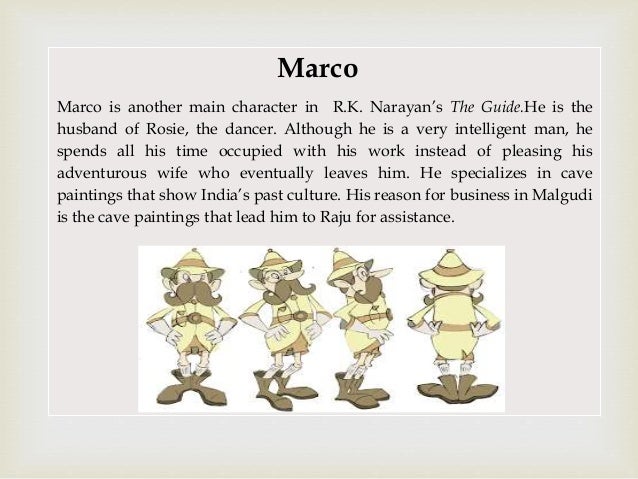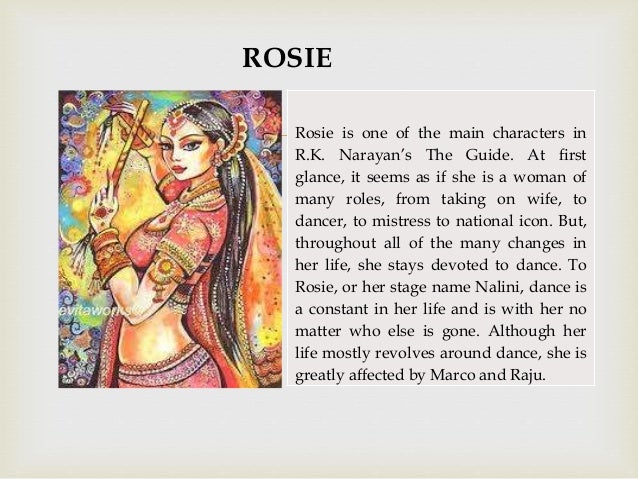For the centennial of his birth, R. Narayan's most celebrated novel. Formerly India's most corrupt tourist guide, Raju—just released from prison—seeks refuge. Narayan's novel The Guide (1958) a common con-man, “Railway” Raju, asks for a few choice morsels under the guise of a religious requirement. For the centennial of his birth, R. Narayan's most celebrated novelFormerly India's most corrupt tourist guide, Raju—just released from prison—seeks refuge.
Article shared by The Guide is the most popular novel of R.K. It was published in 1958, and won the Sahitya Akademy Award for 1960. It has also been filmed and the film has always drawn packed-houses. It recounts the adventures of a railway guide, popularly known as ‘Railway Raju’.
As a tourist guide he is widely popular. It is this profession which brings him in contact with Marco and his beautiful wife, Rosie. While the husband is busy with his archaeological studies, Raju seduces his wife and has a good time with her. Ultimately Marco comes to know of her affair with Raju and goes away to Madras leaving Rosie behind.

Rosie comes and stays with Raju in his one-room house. His mother tolerates her for some time, but when things become unbearable, she calls her brother and goes away with him, leaving Raju to look after Rosie and the house. Rosie is a born dancer, she practices regularly and soon Raju finds an opening for her.
In her very first appearance, she is a grand success. Soon she is very much in demand and their earnings increase enormously.
Raju lives lavishly, entertains a large number of friends with whom he drinks and gambles. All goes well till Raju forges Rosie’s signatures to obtain valuable jewellery lying with her husband. The act lands him in jail. Rosie leaves Malgudi and goes away to Madras, her hometown. She goes on with her dancing and does well without the help and management of Raju, of which he was so proud.
ADVERTISEMENTS: On release from jail, Raju takes shelter in a deserted temple on the banks of the river Sarayu, a few miles away from Malgudi, and close to the village called Mangla. The simple villagers take him to be a Mahatma, begin to worship him, and bring him a lot of eatables as presents. Raju is quite comfortable and performs the role of a saint to perfection.
However, soon there is a severe famine drought, and the villagers expect Raju to perform some miracle to bring them rain. So he has to undertake a fast. The fast attracts much attention and people come to have darshan of the Mahatma from far and wide. On the twelfth day of the fast, Raju falls down exhausted just as there are signs of rain on the distant horizon. It is not certain if he is actually dead or merely fainted.
Thus the novel comers to an 1 abrupt close on a note of ambiguity. The last pages of Narayan’s best novel, The Guide, find Raju, the chief protagonist, at the end of a lifetime of insincerity and pain. As a professional guide to Malgudi’s environs, he invented whole new historical pasts for bored tourists; he seduced a married woman, drifted away from his old mother and friends, became a flashy cultural promoter, and then tried, absentmindedly, to steal and was caught and spent years in jail, abandoned by everyone.
ADVERTISEMENTS: His last few months have been spent in relative comfort as a holy man on the banks of a river: a role imposed on him by reverential village folk. But the river dries up after a drought and his devotees start looking to him to intercede with the gods. Raju resentfully starts a fast, but furtively eats whatever little food he has saved. Then abruptly, out of a moment of self disgust, comes his resolution: for the first time in his life, he will do something with complete sincerity, and he will do it for others: if fasting can bring rain, he’ll fast. He stops eating, and quickly diminishes.
News of his efforts goes around; devotees and sightseers, gathering at the riverside, create a religious occasion out of the fast. On the early morning of the eleventh day of fasting, a small crowd watches him quietly as he attempts to pray standing on the river bed and then staggers and dies, mumbling the enigmatic last words of the novel, “It’s raining in the hills. I can feel it coming up under my feet, up my legs.” Characteristically, Narayan doesn’t make it clear whether Raju’s penance does actually lead to rain. He also doesn’t make much of Raju’s decision, the moment of his redemption, which a lesser writer would have attempted to turn into a resonant ending, but which is quickly passed over here in a few lines. What we know, in a moment of great disturbing beauty, is something larger and more affecting than the working-out of an individual destiny in an inhospitable world. It is and the words are of the forgotten English writer William Gerhardie, on Chekhov, but so appropriate for Narayan that sense of the temporary nature of our existence on this earth at all eventsthrough which human beings, scenery, and even the very shallowness of things, are transfigured with a sense of disquieting importance.
In part one of The Guide, R.K. Narayan tells the story of the main character, Raju, through a mix of flashbacks and memories that serve as a background story for the current narration.The novel opens with Raju finally being released from prison and journeying back home when he meets Velan, an oblivious villager who mistakes Raju for a holy man. The following day Velan brings Raju his resistant half-sister. She was so impressed by Raju that she immediately changed her mind and agreed to marry her selected suitor. Soon enough, Raju becomes a holy adviser for a small village, with Velan as his primary disciple. Although Raju is content with daily food offerings and a roof to live under, he frequently thinks of his childhood and life before jail. Raju grew up in Malgudi, a fictitious town believed to be somewhere in southern India.
His father owned a small shop outside their home and eventually at the train station. Raju always held a deep fascination for the train tracks and their travelers and after his father’s passing, he took the opportunity to become “Railway Raju” and transformed his father’s shop to a trading post for printed materials. Raju remembers first meeting Rosie, the beautiful, but married woman that Raju guides around Malgudi. Her self-absorbed, boring husband allows for Rosie and Raju to spend a significant amount of time together. Raju and Rosie fall in love with each other and one night Rosie relationship with Raju turns from traveler to mistress. The use of flashbacks and memory in N.K. Narayan’s novel allow for the key events of Raju’s lifetime to highlight the present story line.
In part one of The Guide, these flashbacks serve to show how Raju is easily adaptable to different situations, which enables him to become a spiritual adviser after being a convict and a tour guide after being a shopkeeper. Chapters 6-8 y In chapters 6-7 Raju has been called upon by Velan to stop the serious drought that is affecting the village. The cows can’t produce milk and the crops are dying. The villagers continue to bring Raju gifts, and he feels bad. When the villagers start fighting as a result of the drought and the anger from the lack of food, Raju tells the villagers he will fast for the rains to come.
Before he commences his fast he tells Velan his life story. He retells the time he had with a couple, Rosie and Marco. He also retells the problems that arose when Rosie told Marco about their private life together.

The Guide By Rk Narayan Summary
Marco leaves Rosie and eventually Rosie goes to Raju and lives with him. During this time Raju neglects his work as the shopkeeper at train station and “Railway Raju”. Eventually he is fired from his post in the railway shop and that is the end of “Railway Raju”. He lost his job, his reputation, and now rumors have spread of Rosie’s, a married woman, presence in Raju’s house. His life has taken a queer turn for the worse. Raju’s mother sends for his uncle to come.
His uncle arrives to attempt to make Raju get it together, but in Raju’s fury he ends up forcing his mom to leave the house to live with her brother. His mom blames Rosie for all the chaos in the family.
Raju believes that he can turn it around, and he gives Rosie, now Nalini, a tryout with the administrators of the show. They are instantly mesmerized and they give her her chance, but most importantly her accompanists.
Chapters 9-11 As Nalini, formerly known as Rosie, begins to become popular for her dancing, Raju’s debts and finances are completely taken care of. Also, he sees himself as the mastermind behind her newfound fame and prosperity.
They moved out of their mother’s house because Sait managed to get a court order that would have made them pay rent if they decided to live there. As her fame grows, so does Raju’s ego.
He begins to spend money at an absurd rate on meaningless items. He also realizes that being seen with Nalini improves his social status and becomes very controlling of her schedule and whom she can see.
To occupy all of their time and make as much money as possible Raju scheduled dancing recitals left and right. During this period a gap began to grow between Raju and Nalini. Their encounters began to inspire fights between them and awkwardness when they didn’t fight.
Raju was sought ought by the highest members of society for a chance to get Nalini to dance in their palace or temple. Even though Raju still loved Nalini, his lifestyle had turned him into a money hungry monster that used Nalini to support his expenses.one day, Marco’s picture appeared in a local newspaper and this caused a breakdown from Nalini. She still viewed Marco as her husband and now was beginning to think that he was right when he said that being a dancer was being like a trained monkey. Raju became very weary and worried that the subject of Marco might bring up old feelings for him.
These feeling were so strong when he got a book from him that credited him for showing the cave paintings to Marco, he didn’t even mention it to Nalini out of fear she would have a breakdown. Another Letter came to Raju that was addressed to Nalini from Marco. In the letter was a description of instructions on how to how to acquire the jewelry that had belonged to her before she became famous and was still married to Marco (even though she is still technically married to him). Raju did not want Nalini to see this and feared again that she would go back to him, so he forged her signature and sent the letter back to collect the jewelry. During one of Nalini’s performances Raju was arrested for forgery because of a complaint from Marco. When they went to find money to pay for a lawyer and bond money they realized that Raju spent all of their money and Nalini had to dance to pay for his expenses. Even though they hired the best lawyer in all of India, he still managed to get a two-year prison sentence.
This marks the end of Raju’s life story up to this point. Although Velan now knows that he is not truly a holy man, he still believes that Raju can save them from the drought. With that Raju begins his twelve day fast.
On the last day of his fast Raju feels the rains in the mountains and feels the cold water running through his body.